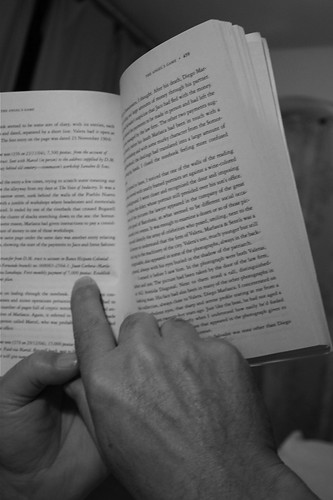The Outsiders was one of the very few books I was forced to read that I actually really loved (and actually read all the way through). At least, I thought I loved it...but then I saw the movie. Sure the story's great, but when you add the likes of Rob Lowe to it the whole thing gets turned up several notches. On film, The Outsiders is a parade of up-and-comers in sleeveless shirts, and there's nothing wrong with that.
The Book
S. E. Hinton started writing The Outsiders at age 15, and Viking Press published it when she was only 18. That was way back in 1967, but it still sells half a million copies every year. Hinton wrote the book about the two rival gangs at her high school: the Greasers and the Socials (shorted to Socs and pronounced soshes).

The book became iconic and extremely popular right away, solidifying S. E. Hinton as a beloved YA author. The story of The Outsiders, a group of poor greasers who are endlessly pitted against the rich and privileged Socs, struck a chord with readers of all ages.
The novel begins with Ponyboy leaving a movie theater and getting jumped by a group of Socs. Lucky for Ponyboy, his two older brothers Darry and Sodapop happen by and break things up. Right away, the reader sees the conflict. We start to become a part of the Greasers' world the next night when Ponyboy and his best friend Johnny go to the movies with Dally. Of all the Greasers, Dally is the most wild. He immediately begins flirting with two pretty Soc girls, Cherry Valance and Marcia, at the drive-in. Ponyboy and Johnny walk the girls home, because that's what you do with pretty girls.
But they get seen by Bob Sheldon and Randy Adderson, two Soc boys. Greaser boys aren't supposed to hang around with Socy girls. Cherry and Marcia blow their Soc friends off and they get home safely. So does Ponyboy, but he's late. Darry, the oldest brother, is stressed out and shouldering respnsibility far beyond his years because their parents are dead. Worried about Ponyboy and frustrated, Darry hits him when he finally comes home. Upset and hurt, Ponyboy takes off again and meets up with Johnny, who has a truly terrible home life. They go to the park to blow off steam and maybe try to get some sleep.
They run into five Soc boys instead. The Socs are drunk and pissed, and they take their rage out on Ponyboy by nearly drowning him in the park fountain. Johnny, terrified, pulls out a knife and stabs Bob. He kills him accidentally in this altercation, so he and Ponyboy run off to find Dally -- the only one who can help them without judging them, or going to Ponyboy's two older brothers. Dally gives them cash, a gun, and a place to go and hide.
At the abandoned church, the boys wash their hair and Ponyboy dyes his to make himself harder to identify. He reads a poem by Robert Frost, "Nothing Gold Can Stay," which becomes a theme for the book. Because they've got so much time on their hands, Ponyboy starts reading my favorite book,
Gone With the Wind, to keep himself and Johnny entertained.
Dally eventually arrives with news. The Greasers and the Socs are angrier than ever following Bob's death, and there's a rumble (a huge fight between the two groups) in the works. Johnny, feeling guilty, makes the decision to turn himself in. He certainly would have done so, but when the three Greasers return from getting some fast food they see the church on fire. To make matters worse, several kids are trapped inside the inferno. Johnny and Ponyboy run into the building to save the kids, and Johnny is severely hurt in the process. Both are taken to the hospital. Darry comes to see his baby brother and in a tearful scene between them, Ponyboy realizes how much Darry loves him.
Johnny and Ponyboy are heroes, but that doesn't change the fact that Johnny is a murderer...or that his back is broken. The rumble is also still on, a decisive battle that will end the turf dispute between the two groups. Darry allows Ponyboy to attend, and the Greasers manage to carry the day. Dally and Ponyboy go immediately to see Johnny in the hospital, who dies. Dally can't take it.
He leaves the hospital and immediately "knocks over" a store, which means he robbed it. Because he's making a huge show of himself about it, the police are on his tail pretty much immediately. Dally points an unloaded gun at one of the cops, and they shoot him dead in the street.
Ponyboy tries to go back to his life, but he can't. He struggles in school, and has just one shot at passing English: write a great theme. He ends up turning to
Gone With the Wind again, and finds a note that Johnny wrote to him before he died. The note tells Ponyboy to "stay gold," and talks about how proud he is that he saved those kids. So Ponyboy sits down to the write. The first line of his theme is the first line of the book
The Outsiders.
The Film
Sounds fantastic, right? A librarian at an elementary school in Fresno, California, certainly thought so. She encouraged students to write to one of the best filmmakers of the day, and of all time, because she thought it would make a great movie. Lucky for the rest of us, Francis Ford Coppola agreed with her.
As Fate would have it, Coppola loaded the cast with young actors and actresses who would go on to big fame and success. The Outsiders boats one of the finest ensemble casts ever assembled, though at the time the film's stars were just a bunch of kids most people didn't recognize. Tom Cruise, Emilio Estevez, Diane Lane, Matt Dillion, Ralph Macchio, Patrick Swayze and Rob Lowe are all in the film, and all deliver great performances.
The film is very, very faithful to the book, even copying some of the dialogue straight off the page. The events of the movie mirror those of the book almost exactly, but for purists there does exist a second version of the film that's even more faithful. Coppola re-released the flick in September 2005 that includes 22 minutes of additional footage that wasn't included in the theatrical release. He adds a beginning scene that shows Ponyboy's fight in front of the movies and scenes near the end. The score is also changed in this second version, featuring more music that was popular during the 1960s (when the story takes place).
What Got Adapted?
There are, of course, some differences between the book and the film. No matter how faithful, no two-hour movie can successfully capture every detail revealed in a book -- even a relatively short YA novel. The film watcher doesn't ever know much about the history of the three boys (Ponyboy, Sodapop and Darry). The movie has also has taken some flak over the years for (of all things) casting. Dally is written as a blonde, which Matt Dillon clearly is not. Nor is Rob Lowe, though he plays Sodapop who is supposed o have lighter hair. Two-Bit, played by Estevez, is taller with sideburns, and some fans felt that Two-Bit's character wasn't jocular enough on film.
But in the main, The Outsiders is an amazingly accurate film reproduction of a book that's controversial and very evocative of a society where the rich and the poor are constantly at odds. Is there any question why that story still resonates so strongly today?


























